Baltimore Symphony’s OrchKids Program
OrchKids is a community engagement program of the Baltimore Symphony Orchestra that brings musicianship, instrument instruction, and ensemble playing to young children at an inner-city West Baltimore elementary school. According to a BSO press release, “OrchKids is a year-round after-school program designed to create social change and nurture promising futures for youth in Baltimore City neighborhoods. OrchKids is a cornerstone of the BSO’s efforts to expand the orchestra’s relevance within the city’s broad and diverse community. In collaboration with several community partners, which includes the Baltimore City Public Schools, OrchKids provides music education, instruments and mentorship at no cost to Baltimore’s neediest youngsters.”
But OrchKids is so much more than what’s implied by the above paragraph. The program at Lockerman-Bundy Elementary School is profoundly changing the lives of so many of the young students who choose to get involved.
Music Director Marin Alsop wanted to get the BSO more actively involved in the city of Baltimore, which includes some of the poorest neighborhoods in the country. She met with Jeffrey Sharkey, Director of the Peabody Institute, to discuss possible outreach programs in Baltimore, and he suggested that she speak with Dan Trahey, a tubist and teaching artist who teaches music teacher mentoring, community engagement, and runs the Tuned-In program at Peabody. Dan was familiar with Venezuela’s El Sistema program (Tuned-In is an El Sistema nucleo for older students) and Marin Alsop wanted to start something similar in Baltimore. Maestro Alsop decided to give $100,000 of her McArthur “genius” grant as a 4-to-1 matching grant to get the program launched, and the result is OrchKids.
First Year
The first year of OrchKids, September 2008 to June 2009, was with the first grade at Harriet Tubman Elementary School, but that school closed and they needed to find another school for the program. They worked with Dr. Andres Alonso, CEO of the Baltimore City Public Schools, Michael Sarbanes, head of the Office of Partnerships, Communications and Community Engagement, and Jay Wolf Schlossberg Cohen of the Rebuilding Through Art Project to identify schools that would be open to the program and amenable to their ideals.Lockerman-Bundy Elementary School was a natural choice because most of the Harriet Tubman kids moved to this school, the Principal, Cynthia Cunningham-Evans, was very eager to incorporate the program into the school day, and the school had both a vacant office and a large room with a storage closet for the instruments. The OrchKids staff will expand the program to another elementary school in the fall of 2010; they work closely with the school system to identify likely candidate schools.
OrchKids chose a first grade class for their first year because they knew they’d be under the microscope from the media, and they wanted to show marked improvement from the beginning to the end of the year. The plan has always been to back up and start the students as young as possible, but they needed to have kids that could show a significant change in behavior, academics, and musical skills. They now start the children as young as 3 years old.
Relationship with the School
Nick Skinner, OrchKids Site Coordinator, is onsite every day from 8:30 in the morning when the kids arrive until 6:30 at night when the kids go home, and is in close communication with the classroom teachers. (Nick and Dan have known each other since growing up together in Travers City MI; Nick works with Dan on his non-profit outreach ensemble, The Archipelago Project.) The intent of OrchKids is not to take over all music education in the schools. Indeed, one of the main tenets in the memo of understanding they have with the Baltimore City Public School System is that OrchKids wants to operate in schools that already have a full-time music teacher. They wish to supplement the existing music curriculum, not supersede it. Nick maintains that relationship – remaining respectful of the time the music educators need, and balancing OrchKids field trips and performances with the school’s testing schedule.
Nick retrieves packets and worksheets from classroom teachers, and gets information about what things individual students need extra help on. For example, classroom teachers provide specific vocabulary lists so the OrchKids teachers can use these words in conversation during the OrchKids lessons, not just in the homework tutoring sessions. The goal is to immerse the kids in the words they need to learn.
Fridays often involve field trips; these include education concerts by the Baltimore Symphony, side-by-side concerts with the Baltimore School for the Arts, and events at the Enoch Pratt public library. Artists from the Lyric Opera come to the school to do presentations, and OrchKids staff make arrangements to bring other special guests to the school. The OrchKids staff are very pleased with the cooperation they receive from Lockerman-Bundy Elementary School teachers and administrators. According to Dan, “There are not too many battles – we are in this together with the school teachers and administrators. We take the kids out of school so much, and the school is very flexible for us. After all, we have them for two 45-minute classes a week, plus sometimes all day to play a concert – but testing and academics always take precedence.”
In the summer they take the kids to Orioles games at Camden Yards and on some nature outings. According to Hillary Hahn, OrchKids Administrative Director, “One of our goals for these outings is to get the parents to join us. As we prove ourselves to be a stable program, we see more parent involvement.”
Recently the OrchKids did a concert with graduates of the Guildhall School of Music and Drama in London and students from the the Wolfe Street Academy in East Baltimore, the Peabody Conservatory of Music, and the Baltimore School for the Arts. The concert was about neighborhoods – the kids wrote all the music. The OrchKids have plans to have a regular Skype conference with Guildhall School’s “Future Band.” Dan describes the collaboration as a careful balance of creativity and precision: “We want to encourage a healthy creative process but also for the kids to sing in the right voices, clap and move together, and play as an ensemble. We’re cultivating them to be able to play. The OrchKids will perform their own composition from this collaboration on their final concert. We’ll polish it but it won’t be a finely honed performance.” Indeed, one of the tenets of El Sistema is to perform works in progress.
How It Works
OrchKids involves two components: musicianship classes for all Kindergarten and pre-K children during the school day, and intensive after-school sessions for students involved in the OrchKids program.
The in-school sessions run from 10:20 to 2:50 and are led by Dr. Eric Rasmussen, Chair of the Early Childhood Music Department at Peabody Conservatory. Eric works with 55 pre-K children and 35 Kindergartners, plus the 1st and 2nd graders in the OrchKids after-school program. I observed him working with K and pre-K students – the first graders were being tested the week of my visit. He has the children sing intervals, both while he plays keyboard and as straight solfège. He does very complicated vocal rhythms, asking the kids to repeat them back, both as a group and individually. The kids were amazingly accomplished at this; Eric tells me that some high-school students can’t do the rhythms that the Kindergartners handle with ease.
Eric’s intent in these classes is to teach audiation as developed by Dr. Edwin Gordon – to get the kids to hear the music and learn the syntax of music before being exposed to notation. In essence, he wants the kids to be able to sing the melody before learning which fingers on the instrument will produce the notes. According to Wikipedia, audiation is “the process of mentally hearing and comprehending music, even when no physical sound is present. It is a cognitive process by which the brain gives meaning to musical sounds. In essence, audiation of music is analogous to thinking in a language.”
When I was visiting, Eric was preparing the children for a BSO Young People’s concert where they would listen to Saint-Saens’ Carnival of the Animals. He had the kids dance with brightly colored scarves, imitating various animals (they seemed to like the elephant the best!). It was charming to watch how engaged some of the children were as they tried to imitate Eric’s movements.
The OrchKids staff observes the in-school classes and selects the students for the after-school program according to four criteria: musical aptitude, parent commitment, behavior,and most importantly, the want. According to Nick, “We’re always fishing for kids that have the want to be involved; as we lift the net up, we loosen the sieve a bit and the kids that don’t fit the program fall out. Everyone gets exposure in the beginning – the parents and the kids can then decide whether to be part of the program or not. This year we have 155 kids – over 50% are only [involved] during the day. We have 70 kids in the after-school OrchKids program.
The first year in the program involves three nights a week; the students have choir and then Exploratory classes where they’re introduced to the violin, recorder, and trumpet throughout the year, and also play in “Bucket Band” once a week, led by BSO percussionist Brian Prechtl. (Bucket Band involves large orange pails or buckets, turned upside down, and drum sticks.) The Exploratory teacher, Karen Seward, talks about the families of instruments and how they differ as the kids explore violin, trumpet, recorder, and xylophone. She also teaches the children what it means to make a good tone on an instrument.
In the second year, the students select an instrument and start group lessons four times a week with Jill Collier for strings, Rachel Choe for woodwinds, and Peter Lander for brass. The available instrument choices are violin, cello (though I saw one bass player as well), flute, clarinet, trumpet, or baritone. (As the children get older, their choices of instrument will get wider.) If a parent comes to the school for a lesson on proper care of the instrument and the OrchKid is well behaved, a child can take the instrument home on Thursday and keep it over the weekend. The second-year students also begin ensemble, where the violins, flutes, and trumpets play together, and then the cellos, clarinets, and baritones.
Eli Wirth (Music Director of the Frederick Regional Youth Orchestra and the Director of Music at Carroll Community College in Westminster, MD) runs the ensemble classes; he works on breathing, rhythmic coordination and blending, and the students start to read music.
The Nitty-Gritty
The after-school program runs Monday through Thursday from 3:30 to 6:20. The children have dinner at 3:30 (see below for information on the funding of this meal), and then everyone has choir with Molly Peterson at 4:00 – 65 kids ranging from pre-K to five 3rd graders. The students then break out into small groups:
- The first-year students rotate between an Exploratory class and tutoring classes with Molly Peterson and Sherrie Jefferies, where they work on their homework or other activities provided by the tutor, such as coloring or word games, and on Thursdays they have Bucket Band with Brian Prechtl. (Some parents prefer to work on homework with their kids themselves in the evening and request that the OrchKids staff not assist with homework.)
- The second-year students rotate between group lessons on their chosen instrument and tutoring classes. On Wednesdays, they have ensemble with Eli Wirth.
In addition to the full-time staff (Dan, Nick and Hillary) and the 9 independent contractors, OrchKids has a team of volunteers present all the time: official volunteers, paid interns,Peabody students, students from other area universities (Towson,Univ.of Maryland, Goucher), and other interested people. For example, Marian Hahn, who’s on the piano faculty at Peabody, has reduced her teaching role so she can spend time with the program.
OrchKids has partnerships with local financial institutions and corporations who send employees to mentor the children, spend time with them in the cafeteria, and generally encourage the kids. A Vice President of a Baltimore bank was volunteering during my visit; the kids obviously knew her quite well and were eager to greet her. She told me she comes regularly a few times a month.
According to Dan, “Most of these people have come to us – it’s not that people in Baltimore have turned their backs on Baltimore’s problems (it’s hard to because the ghettos are so close to the more affluent parts of town) but they just don’t know where to start helping. It’s easy to send money to Haiti but it’s hard to look in your backyard and figure out what to do. There are major disasters happening here in Baltimore, and OrchKids is a portal for helping people to help people in this community. We’re the bucket and people can put in drops and the bucket fills up. These volunteers are helping us progress towards a greater goal; we’re going to need more volunteers as the program grows. And the volunteers are helpful to us when we ask their businesses for contributions, because these senior people have already volunteered and already know what’s going on with the program and the kids. It’s important to stress that this is a social program, not just a music program.”
Impact of the Program
I spoke with Laterra Lassiter, an 11-year-old 6th grade student at Steuart Hill Academy who comes after school to help set up the supper program, and for her clarinet lessons. She started in the program last year at Harriet Tubman and just began playing clarinet this year. She tells me she’s been playing piano for a long time. I asked her about last year. “The program was fun. I learned how to play the xylophone and the violin with Miss Karen – we learned to pluck it with our fingers and eventually play it with the bow. I like the clarinet better – I can play louder; I like to play the high notes and the low notes.” She also likes the Beyoncé song, Halo, she’s learning with Miss Molly in choir.
Laterra is playing a lot of songs on the clarinet and tells me she practices 24 hours a week. Four of her siblings are also in the program: Jada (9) plays cello; Ashanti (7) plays violin; Jonah (10) plays flute, and pre-K Elijah has just started. The five of them practice together at home.
Little Miguel Ware was following Dan around and then came into the office with a baritone case that was bigger than he is. (Miguel is a very precocious 5 year old who was featured in the 60 Minutes segment.) I asked him why he played such a big instrument and he said, “The baritone is the best instrument for me to play; I like to play it best – it’s fun. I like choir and playing my instrument. In my house we all sing together – we sing for our parents.” He then picked up his baritone and played a few notes with amazingly clear tone quality.
I asked Miguel why he was in OrchKids. “It’s very fun to play the instrument and I like going to bucket band and playing the trumpet. Next year I’ll play tuba in the orchestra – I picked it because I never tried it before and I think the tuba is a good one for me to play.” (Did I mention that Dan plays tuba?) Miguel wants to be a music teacher when he grows up.
Click for a YouTube video of Miguel Ware talking about playing the tuba.
Dan tells me that during an instrument zoo they did for the pre-K classes, Miguel picked up the baritone. He can sing on pitch with no trouble. One of his brothers picks him up after the program at 6:30. By starting the kids in pre-K, they’re giving them a leg up from the beginning. “Miguel really likes coming into my room and playing his instrument.”
Finally Lynette Fields, a parent who lives an hour away by bus, agreed to speak with me. She has two children in the program – Andre and Asia, twins, are 8 years old and in the 2nd and 3rd grades. This is their second year in the program. She said that her children love being part of OrchKids and love coming to school. Last year they didn’t miss a day. She has trouble keeping them away from the buckets at home.
Andre plays the cello: “He’s so sensitive. I like to sit with him while he’s practicing. They both want to practice all the time. Asia is really into it – she’s passionate about it. She’s going to the next level, as long as I can keep her in the program.”
She spoke about how her kids play on the porch on Sunday for family gatherings, and how Asia had a solo at the concert the previous Friday, playing the same song she had performed for the family.
I asked her what difference OrchKids had made in her children’s lives. “Dan and Nick are really good with my kids – they tell me some things about the kids that I wouldn’t know otherwise. Asia does pretty good with her reading but she wasn’t so good with math. She’s better now – so is Andre. They wouldn’t have the opportunity to play instruments without this program.”
Click for a YouTube video of Asia Palmer talking about playing her flute.
Funding
Hillary Hahn, the OrchKids Administrative Director, is in charge of the strategic business planning, budget, payroll, development and PR/marketing efforts, assessment strategies, and is the liaison for OrchKids at the Meyerhoff. The yearly budget for OrchKids is approximately $400,000, serving 155 students, so the cost per child is about $2500. OrchKids has three full-time employees: Dan Trahey, Nick Skinner, and Hillary Hahn, and nine independent-contractor teaching artists.
As stated earlier, Marin Alsop donated $100,000 of her McArthur Foundation grant as a 4-to-1 matching grant, to start the process of raising the necessary funds. The majority of the funding for the program comes from local family foundations, some individual giving, and one very generous million dollar gift from Robert E. Meyerhoff and Rheda Becker. According to Hillary, “It takes several years to cultivate national funders; we’re starting that process now. Our pilot year is over, and we’re into our solid first year. This is important to attract national foundation giving; we’re keeping track of data so that we’ll have a good assessment in place.”
Hillary works with the existing development team of the BSO to cultivate new donors and maintain existing donors by providing them with updates, programs, events, and apprising them of future project plans. She also works with the BSO’s marketing team in creating new brochures and keeping the OrchKids message fresh. She’s working on a “Sponsor a Student” campaign, and continually looking for new local foundations who will be interested, not only in the arts & culture component of this program, but also in the social aspects.
BSO Involvement
Brian Prechtl, percussionist, is the only BSO musician on the payroll of the OrchKids program. However, last year the BSO musicians raised a few thousand dollars to buy holiday presents for all the kids; they bought the freezer and refrigerator the program uses for the food bank program; many consult regarding instrument purchases and one BSO musician who owns a music store in town sells the program instruments at cost. The symphony does side-by-sides with the kids, symphony musicians come out to the school and play for the kids, and they meet with them after concerts. And as the kids get better on their instruments, they will need private instruction.
For next season the BSO has commissioned David Rimelis to write a new piece that will be performed by OrchKids musicians, students from the Baltimore School of the Arts and BSO musicians on a regular subscription concert in April. According to Dan, it’s quite a challenge for the composer to write a cohesive piece with three sets of parts that are 1) easy enough for the OrchKids to handle, 2)accessible for the high school kids, and 3) interesting enough for the professionals.
Federally-Funded Meals
Every day when there’s an after-school program, the children are fed a box supper of a sandwich, apple sauce, cookies, a snack (e.g., peanuts or crackers), fresh fruit, and milk. Anything a child doesn’t want goes into a “Share Box” for others children or parents to take home. OrchKids has worked hard to get the kids a nutritious dinner, including fruit, rather than the traditional after-school snack of Animal Crackers and a juice box; they hope to be able to provide a hot meal in the future. Given that the children stay at the school until 6:20, it’s important to feed them something substantial.
The food program is a result of the work and interest of Tony Geraci, former Director of Food and Nutrition in the Baltimore public schools. He runs an organic farm outside of Baltimore where kids come and help grow vegetables, harvest them, and teach others about farming. Tony is working on integrating the farm with the Institute of Culinary Training in Baltimore– their students work with OrchKids, teaching them about nutrition and food. His goal is to provide free nutritious meals to all Baltimore public schools.
The dinners are paid for by a federally-funded reimbursement program – the OrchKids dinners are the first use of this program in Baltimore. OrchKids didn’t have the means to front the food to start the reimbursement, so Gary Davis, CEO of East Side Entrees, stepped forward and gave an in-kind donation of 60 days of food to jumpstart the program. The Federal program provides $2.50/day for each student; all the money is filtered through the budget with the public school system, and East Side Entrees still provides the food.
Summary
I met with Dan Trahey in the lobby lounge at the Meyerhoff one morning to ask him to elaborate on his thoughts about OrchKids and its mission in Baltimore. Dan has been to Venezuela several times to observe and participate in the El Sistema program there – most recently he took his Archipelago Project for a 10-day residency in June 2009. [Polyphonic did a Spotlight on the Archipelago Project’s trip to Venezuela last summer.] I know from his time in Hartford that Dan is extremely passionate about using music education to effect social change; he started an El Sistema nucleo at Peabody 5 years ago, and traveled to Baltimore every Friday while working for the Hartford Symphony Orchestra. His passion and excitement for the project continues to grow, and he plans to expand the program to include four satellite nucleos in Baltimore, all feeding into a large orchestra at the Lockerman-Bundy school.
OrchKids is a social program. We’re hoping to be able to influence the way these children are living their lives and the decisions they make beyond school. We’re testing them and they’re thinking about their educational life in much longer terms than most kids.
What will they do after elementary school? Now they talk about their careers and about going to college. Kids with more education tend to make better decisions about their future and their finances.
We’re building harmony, fellowship, team building and self-respect. One day it’s a social program, the next day it’s a music program. If the kids aren’t progressing and making beautiful music, then the skills they develop aren’t going to carry over to other areas in their lives.
You can’t underestimate the importance of music. Scientists are doing a lot of testing and are showing that music can make major changes in a child’s life, which is why we’re interested in doing research on music and the brain. Crime rates go down when young people are involved with music – it is this amazing preventative medicine. Less bullets more brass!! As musicians we must be the catalyst for this social movement. We must accentuate this importance – we must stand up and say it forcefully!
We’re not giving children enough credit for what children can do – this ‘we’ includes parents, schools, and especially the music educators of the world. Shame on all of us. The only limitations the children have are what adults put on them. Why not put an orchestral instrument in their hands when they’re young? Wealthier kids have the opportunity to play from an early age. But a normal child can’t start until 5th or 6th grade because the public schools won’t fund it. The kids are kicking soccer balls and hitting baseballs years before they have a violin in their hands.
We should start the kids as early as possible on an instrument. I realize that not all of them can handle a tuba or a cello, but put something in their hands. Especially in the strings – the earlier the better. Music has become a luxury item – we’re trying to take the luxury out of it. We got some hate mail when we started this program from established music education groups and societies because we’re starting the children so early with instruments.
Music is different for them – they don’t see it as an academic subject. Singing or rapping or playing an instrument is cool – math may not be as easy as an entry point into a child’s development.
We’re working with children here that have great rhythm, an increasingly solid work ethic and a want to excel musically. Everyone on my staff recognizes that these kids are musically talented and that we have the biggest natural resource – a child’s time and energy. Kids can be so focused on what we’re doing: if rehearsal is 5 hours, they’ll be there for 5 hours. They’re greater than gold – these kids can do it!
In the face of all this negativity and crime, there’s a tremendous amount of beauty here – that’s the can-do attitude!

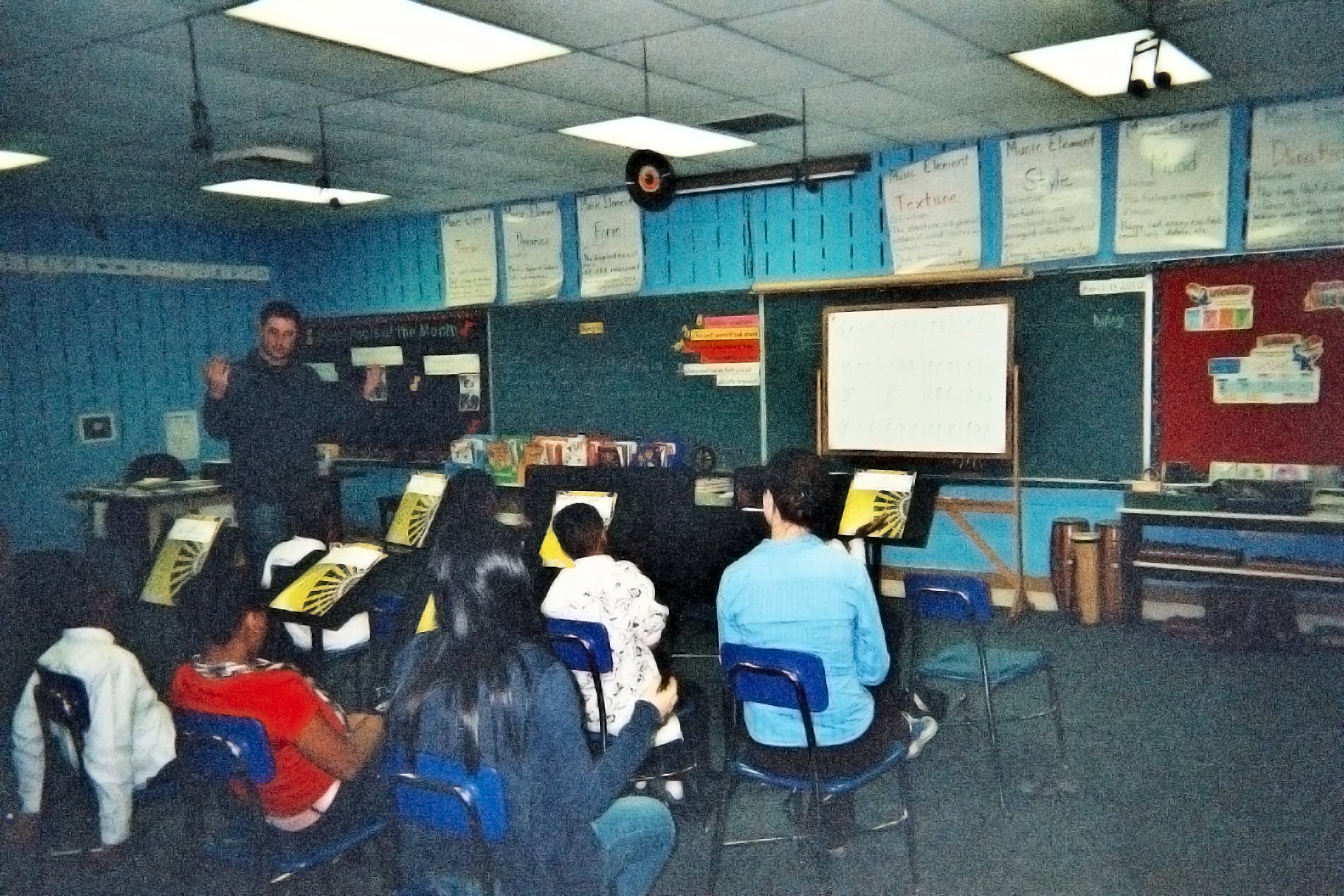
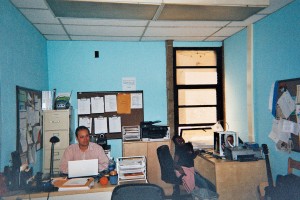
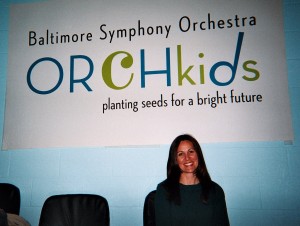
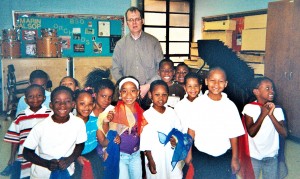
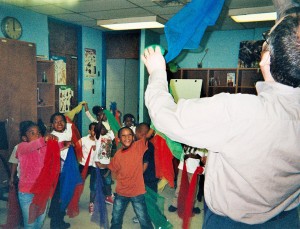
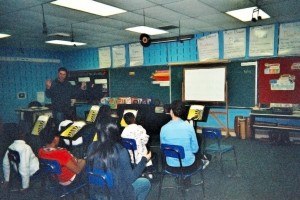
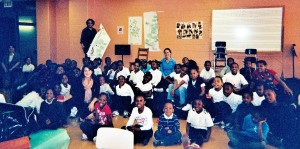
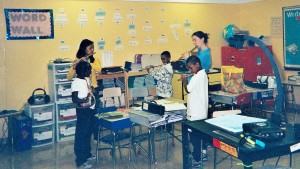
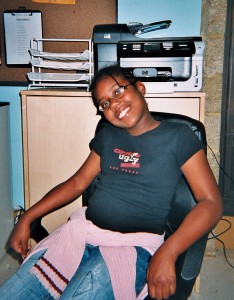
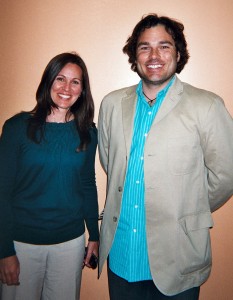
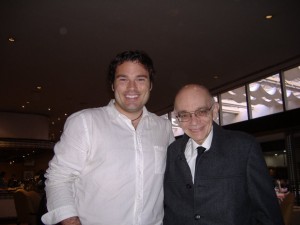
No comments yet.
Add your comment